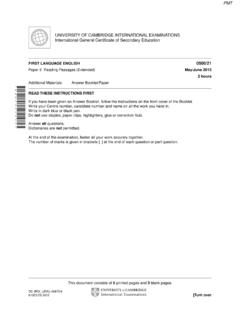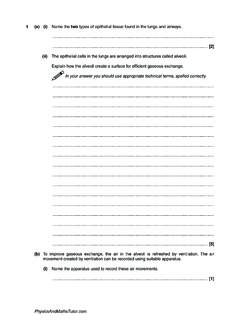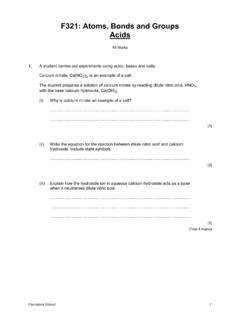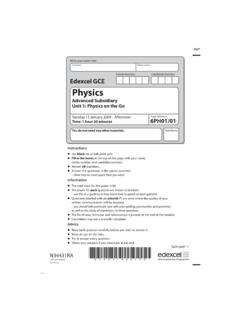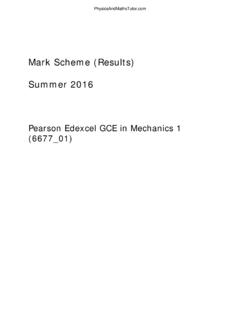Transcription of Dr Jekyll and Mr Hyde - English Literature GCSE - PMT
1 AQA English Literature GCSE Dr Jekyll and Mr Hyde Context Contents Religionpage 2 Sciencepage 5 The Psyche and Sigmund Freudpage 7 The Gothicpage 8 Scotland, England and Victorian Britainpage 11 Religion Religious allusion The text is rife with biblical allusion . At the time, the majority of the population would have been religious so by referencing (arguably) the most influential book the Bible, Stevenson is using a universally recognised system of symbolism . Religion also invokes an intense feeling of tradition and history , and on the whole makes the text feel much more serious. This adds power to the text. Examples of biblical and religious allusion within the text include: really like Satan.
2 That human Juggernaut - which likens Hyde to a powerful Hindu God. if ever I read Satan's signature upon a face, it is on that of your new friend . I incline to Cain s heresy - this refers to the Biblical story of Cain and Abel (the first two sons of Adam and Eve). In the story Cain murders his brother Abel as he is jealous that God prefers the sacrifices Abel makes to please God. Some people believe that Cain is therefore the origin of greed and evil. The comparison to the two brothers, one good and one evil, is symbolic of the duality found within Jekyll and Hyde. Religious allusions also work to solidify the theme of religion vs science within the text , and ensures that the reader is always aware of this juxtaposition within their own society.
3 Transmorphism Transformation and changing state is central to the text, as it deals with the connection between Mr Hyde and Dr Jekyll . In the Victorian era, many people were religious and would have focused on a biblical reading of transmorphism to assess it s morality . Transformation is mentioned briefly in the bible: Corinthians 5:17 - therefore if any man [be] in Christ, [he is] a new creature; old things are passed away; behold, all things are become new Colossians 3:10 - and have put on the new self, which is being renewed in knowledge after the image of its creator In these passages, it is implied that only Christ has the power to perform change in society, and that transformation should always have a positive impact.
4 In Jekyll & Hyde, this sentiment is clearly disregarded when Jekyll firstly changes himself without Christ s input, and secondly when he utilises the ability to transmorph for destructive and detrimental reasons. Stevenson s attitude to religion Stevenson was exposed to both scientific and religious influences through his family and socialisation. His father was a Calvinist , so when Stevenson announced that he no longer chose to believe in God, it seemed to significantly damage his family relationships. Calvinism The church of Scotland is largely based on Calvinist principles . Calvinism is a type of protestantism based on John Calvin s teachings. As an infant, Stevenson was read Old Testament scripture. Calvinism frustrated Stevenson because morality requires a perfection which was impossible for people as it contradicted human nature.
5 In this respect, he felt it was very hypocritical. Stevenson s father himself was a Calvinist and upon Stevenson telling him of his rejection of religion he was angry, causing Stevenson great anguish. Impact of religion on the characters Stevenson s characters are clearly impacted by religion, this is shown by their actions as well as dialogue. Utterson s schedule is set according to the ring of the church bells , which implies the significant religious influence on his life and on his routines. It was his custom of a Sunday, when the meal was over, to sit close by the fire, a volume of some dry divinity on his reading desk, until the clock of the neighbouring church rang out the hour of twelve, when he would go soberly and gratefully to bed.
6 He was now no less distinguished for religion - suggests Jekyll previously completed religious work and study. Jekyll goes to God for redemption when he realises his profound mistakes; had fallen upon his knees and lifted his clasped hands to God . Changing religious beliefs Over the course of the 1800s, many started to become skeptical of both spirituality and religion. This waning in belief was caused by a variety of factors such as: Thomas Huxley and Agnosticism : Huxley was a scientist in the 1800s, and an advocate for Darwin s teachings and research. He coined the term agnostic to describe someone who thinks it isn t possible to know if there is a/are God(s), or not. He relied upon empirical evidence to support knowledge about the world, and thought that faith and science were mutually exclusive.
7 The industrial revolution meant that new products were increasingly available, in particular to the wealthier classes. For many, material comforts came to replace spirituality and religion . Urbanisation caused a massive shift in routines and general living, so attitudes towards religion shifted massively as well. Strauss wrote Das Leben Jesu , which criticised Christian teachings about Jesus miracles, causing many Victorians to lose their faith. Overall, the Church lost a lot of its influence within society. In 1829, a law instructing anyone wanting to hold public office to pledge an oath dismissing Catholic beliefs was lifted. In 1851, 40% of the population went to church , according to the public census.
8 The changing role of religion in many people s lives would have led to great anxiety, something Stevenson manipulates in his writing to create fear in the reader. Novel s reception by religious communities The novella was interpreted by many contemporary critics and readers as much more powerful than a shilling shocker . A sermon preached in St Paul s Cathedral even used text from the novel around the time it was published as it was seen as concerning the essential tale of good vs evil. One paper likened it to the writings of the Apostle Paul, as it concerned the two-fold nature of man . Science Effect of Science and Technology on society In Victorian society, the advancement of technology and other scientific discoveries led to a great improvement in the everyday lives of the population.
9 The industrial revolution brought about a new era of prosperity - through the actual benefits were really limited to the upper and middle classes. During this era, the population skyrocketed - increasing from 8 to 30 million between 1800 and 1900. This was due to the improvements in medical understanding and better infrastructure in the cities. In addition to this the railway network expanded which enabled many less-wealthy people to access new places. Exports also grew from 25 to 75 million, which reflected an economy which could provide this array of technological and scientific advances funded by both industry and the government. Darwinism Charles Darwin claimed that evolution occurs by natural selection . In 1871, Darwin published his book, The Descent of Man in which he applied his theories of evolution by natural selection to human evolution.
10 There was a sense of fear of this scientific development going against religion , as creationism (the concept that God created everything and everyone in the world) was pitted against evolution - this lead to a rise in atheism. Stevenson plays on fears of degeneration or devolution by giving Hyde ape-like and caveman esque features. In the novel, Mr Hyde is labelled as a troglodyte ; perhaps this is a comment on the theories of evolution - he is a regression to the primitive and violent stage of development. The fear of devolution was prevalent in fin de si cle gothic Literature . John Hunter John Hunter is often considered Stevenson s inspiration for the character of Dr Jekyll . He was a doctor of a high status who was well regarded within his circle of friends in London.



